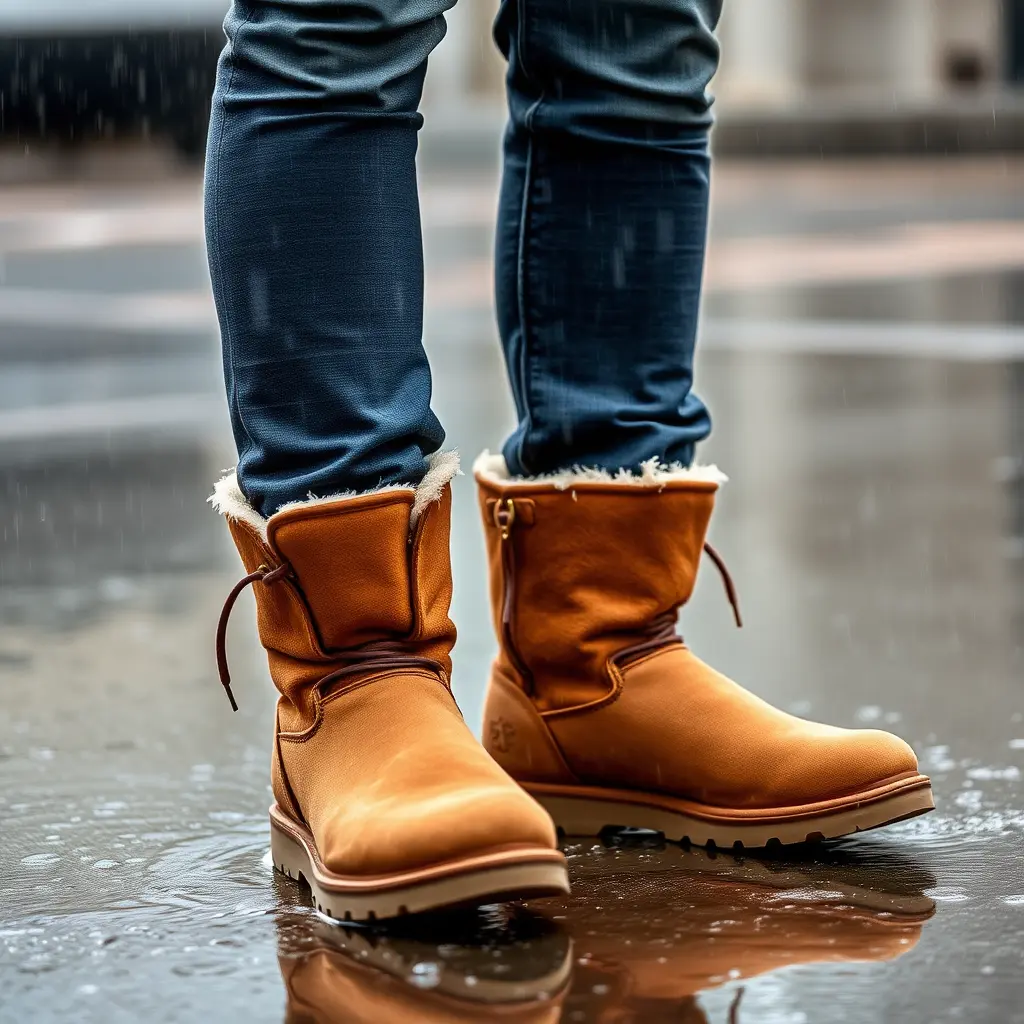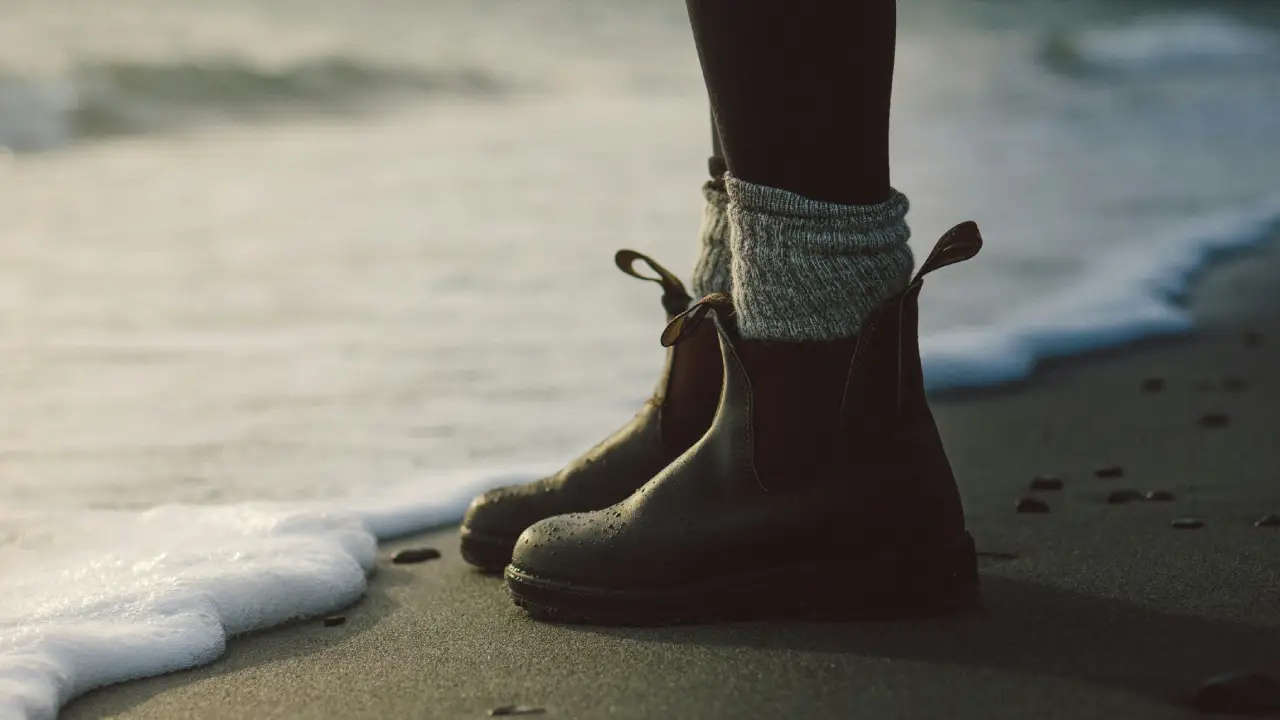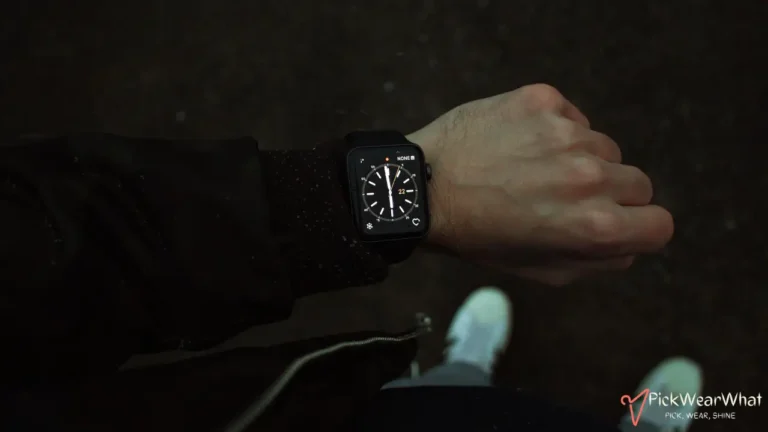You should avoid wearing Uggs in the rain. Ugg boots are typically made from sheepskin and suede, which are not designed to handle excessive moisture. Wearing them in wet conditions can damage the material, causing stains and reducing the lifespan of the boots. If you must wear Uggs in the rain, consider treating them with a water-resistant spray or opting for waterproof versions designed for wet weather.
Why Are Uggs Not Ideal for Rainy Weather?
Uggs are not suitable for rainy weather because they are made from materials that are vulnerable to water damage.
Sheepskin and Suede Absorb Water
Ugg boots are primarily made from sheepskin and suede, which are highly absorbent materials. When exposed to water, these materials soak up moisture, causing stains and compromising the structure of the boots. Prolonged exposure to rain can leave lasting marks and discolorations, making Uggs less durable and less attractive over time.
Damage to the Fleece Lining
The inner lining of Ugg boots, made from fleece, is designed to keep feet warm and cozy. However, when the boots get wet, the fleece can lose its insulating properties, making the boots less effective at providing warmth. Wet fleece also takes a long time to dry, which can lead to discomfort and even odor if moisture is trapped inside.
Loss of Shape and Structure
Water exposure can cause Uggs to lose their shape and structure. The materials may stretch or warp when wet, leading to a less snug and comfortable fit. Over time, this can affect the overall performance of the boots, making them less supportive and stable.
Lack of Traction on Wet Surfaces
Uggs are not designed for traction in wet conditions. Their soles are typically made for comfort and indoor use, which means they can be slippery when walking on wet or slick surfaces. This increases the risk of slips and falls, making Uggs impractical for rainy weather.
Long Drying Time
Uggs take a long time to dry after being exposed to water. Unlike synthetic waterproof footwear, Uggs require more care and time to properly air out. This long drying process can be inconvenient, especially if you need your boots for daily use.
What Happens When Uggs Get Wet?

When Uggs get wet, the material, typically made of sheepskin and suede, can be negatively affected. Here’s what happens:
- Staining and Discoloration: Water can cause unsightly stains and discoloration on the surface of Ugg boots. Suede and sheepskin absorb moisture quickly, which can leave watermarks.
- Loss of Shape: The boots may lose their original shape when exposed to water. The sheepskin material becomes softer when wet, potentially causing the boots to stretch or deform.
- Damage to the Sheepskin Lining: If the interior of the Uggs gets wet, the sheepskin lining may become less fluffy and lose its insulation properties, affecting both warmth and comfort.
- Mold and Mildew Growth: Without proper drying, moisture trapped inside can lead to mold and mildew, especially if left in humid environments.
How to Protect Uggs in Rainy Conditions?
To protect your Uggs in rainy conditions, follow these steps:
1. Apply a Waterproofing Spray
- Use a Water-Repellent Spray: Choose a waterproofing spray specifically designed for suede or sheepskin. Apply it evenly across the entire surface of the boots.
- Reapply Periodically: Reapply the spray every few weeks or after wearing the boots in wet conditions to maintain protection.
2. Avoid Direct Water Exposure
- Wear Rain Covers or Overshoes: Use waterproof overshoes or covers on rainy days to shield your Uggs from water.
- Opt for Alternative Footwear: On particularly wet days, consider wearing rubber boots instead of Uggs to prevent exposure to heavy rain.
3. Dry Properly If They Get Wet
- Blot with a Dry Cloth: If your Uggs do get wet, gently blot away excess water with a soft cloth.
- Air-Dry Naturally: Stuff the boots with newspaper to maintain their shape and allow them to air-dry away from direct heat sources, which could damage the material.
4. Regular Cleaning and Maintenance
- Use a Suede Brush: Regularly brush the suede with a soft suede brush to maintain the appearance and texture.
- Clean Dirt Immediately: Remove dirt and stains promptly using a suede cleaner to prevent further water damage during future use.
Can You Wear Uggs in the Snow?
Yes, you can wear Uggs in the snow, but traditional Ugg boots are not inherently waterproof. Even if you apply a waterproofing spray, your Uggs may still allow snow or moisture to seep through the suede material or the seam between the sole and the boot. While this can help in light snow or dry conditions, it’s important to recognize that Ugg boots are not designed for heavy or wet snow unless you opt for specific waterproof models.
What Types of Uggs Are Suitable for Snow?
- Waterproof Ugg Boots: These are specifically designed to keep out moisture and are your best option for wearing Uggs in heavy or wet snow.
- Water-Resistant Ugg Boots: These provide some level of protection in light snow but might not be reliable in wet conditions.
How to Protect Regular Uggs in Snowy Conditions?
If you choose to wear traditional Ugg boots in the snow, you should:
- Apply a waterproofing spray: This can help make them more resistant to moisture, but keep in mind they won’t become fully waterproof.
- Avoid deep or wet snow: Uggs may still absorb water through the suede or seams, especially in wet or slushy conditions.
- Use waterproof gaiters: Adding external protection can help prevent snow from getting inside the boot.
Can You Wear Uggs Outside?
Yes, you can wear Uggs outside, but it’s important to consider the weather conditions and terrain. Uggs are made from sheepskin and suede, which are not naturally waterproof, so they may not perform well in wet or muddy environments unless treated with a water-resistant spray. However, Uggs are perfect for cold, dry weather because they offer excellent warmth and comfort. Here are a few things to keep in mind when wearing Uggs outside:
Weather Considerations
- Cold and Dry Weather: Uggs are ideal for dry, chilly days since the sheepskin lining provides insulation.
- Rain and Snow: Uggs are not waterproof, so avoid wearing them in heavy rain or snow without proper treatment.
- Mud and Dirt: Wearing Uggs in muddy or dirty environments may stain the suede, requiring more care and cleaning.
How to Extend the Lifespan of Uggs When Wearing Outside?
To extend the lifespan of Uggs when wearing them outside, proper care and preventive measures are essential. Here are some tips to help you keep your Uggs in great condition:
1. Waterproofing Uggs
Before wearing Uggs outside, apply a waterproof spray specifically designed for suede and sheepskin materials. This will help protect your boots from moisture, rain, and snow. Reapply the spray every few months or as needed.
2. Cleaning Regularly
- Remove dirt and debris using a soft suede brush after each use, especially after wearing them outside.
- For stains, use a suede cleaner or a gentle soap solution to spot clean. Avoid using too much water as it may damage the material.
- Always allow your Uggs to air dry naturally, away from direct sunlight or heat sources like radiators.
3. Use a Suede Protector
In addition to waterproof spray, a suede protector helps to prevent stains from dirt, mud, and accidental spills. Applying this product after cleaning helps maintain the softness of the material.
4. Avoid Wet and Muddy Conditions
Even though waterproofing helps, it’s best to avoid wearing Uggs in very wet or muddy environments. Prolonged exposure to water can still damage the suede and cause discoloration.
5. Store Properly
When not in use, store your Uggs in a cool, dry place, away from sunlight to prevent fading. Keep them upright by using boot shapers or stuffing them with newspaper to maintain their shape.
6. Rotate Your Footwear
To avoid excessive wear, rotate your footwear. Give your Uggs time to air out and recover after extended use, especially if you’ve been wearing them for long periods outside.
7. Replace Insoles
The insoles of Uggs can flatten over time, especially with outdoor use. Replacing the insoles periodically will help maintain comfort and extend the overall lifespan of your Uggs.
FAQs On Can You Wear Uggs in the Rain
No, traditional Ugg boots are not waterproof, and wearing them in the rain can cause the suede material to get damaged or stained. It’s best to avoid wearing untreated Uggs in wet conditions.
Yes, Ugg offers waterproof boots in their collection, such as the Ugg Adirondack and Ugg Butte lines, which are designed for rainy and snowy conditions.
If Uggs get wet, the suede can stain and lose its softness, while the sheepskin interior may lose its insulating properties. It’s essential to let them air dry slowly and avoid using heat to prevent shrinkage or further damage.
To dry wet Uggs, stuff them with newspaper or a towel to absorb excess moisture and allow them to air dry in a well-ventilated area. Avoid using direct heat sources like radiators, as this can shrink and damage the material.




